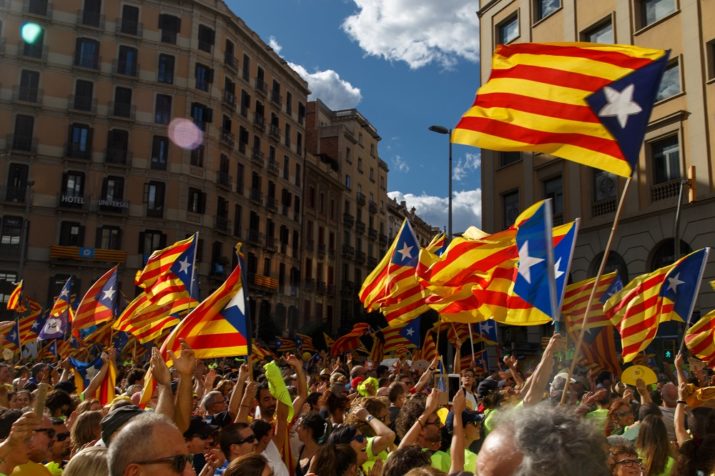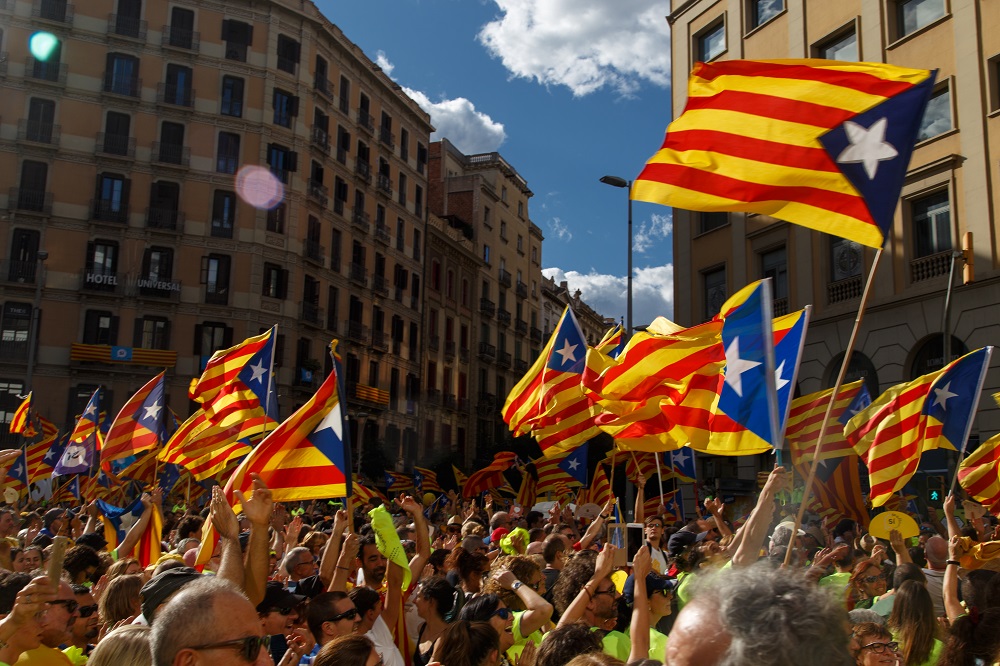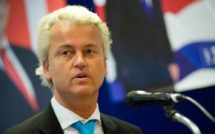

This is part of our special feature on Nationalism, Nativism, and the Revolt Against Globalization.
Spanish writer José Ortega y Gasset stated in 1932 at the Spanish Parliament that the Catalan question cannot be solved, it can only be put up with.[1] By 1999, pro-independence parties owned 16 percent of the Catalan Parliament, whereas in 2015, they owned 48 percent of the seats, declaring independence October 27, 2017 and attempting to end a relationship of hundreds of years between Catalonia and Spain. But why did nationalism increase in the last two decades? What kind of narrative has Catalan nationalism created that has been so convincing? Last but not least, as Spain is a member of the European Union, what was the latter’s position?
Since the economic crisis began, Catalan nationalism has abandoned its traditional cooperation with the central government. This radicalization happened under the argument of lack of economic assistance, the impossibility of recognizing of its particularities, and political repression, leading towards a unilateral policy. Moreover, Catalan nationalism identified not only a foreign enemy — Spain — but domestic enemies — those who support unity with Spain.
Spain and Catalonia: a troubled marriage?
In order to understand these events and answer these questions, we must look back to the past. Having never achieved independence due to the proximity of stronger powers, and as a group of small territories, Catalonia joined the neighboring kingdom of Aragon during the Middle Ages. In the late 15th century, the first step toward the unity with the rest of the Iberian Peninsula happened through the dynastic union between Aragon and Castile, although both kingdoms preserved their own institutions and languages. The construction of a centralized and absolutist monarchy during the Early Modern Ages led Catalonia (1640) and Aragon (1705) to rebel against the king and once they were defeated, to lose their charters and institutions in 1714. The essence of the resulting state was Castilian, with Spanish as the main language.
During the 19th century, a romantic movement called Renaixença (Renaissance) tried to revive the Catalan language, and at the same time, the Catalan bourgeoisie attempted to increase its control over the region. A new Catalan nationalism was born, which desired to be a part of an Iberian federation, but never with the goal of achieving independence.[2] Over the next century, some attempts to recognize Catalonia’s cultural peculiarities have happened. The Commonwealth of Catalonia (1914-1925) or the Statute of Autonomy of Catalonia (1932-1936) came to an end because both the dictatorships of Primo de Rivera and Franco respectively considered any decentralizing effort or recognition of the diversity of Spain as a threat to its unity. At the same time, the industrialization process that Catalonia experienced during the 1960s brought thousands of people from other regions of the country that did not speak Catalan, the local language.[3] Franco’s death was followed by the approval of a democratic Constitution that provides sovereignty to the whole Spanish people (1978); a new Statute of Autonomy one year later, in which the cultural diversity was recognized; and the political-administrative division of the country in seventeen autonomous regions that made of Spain a quasi-federal country.[4]
After the celebration of the first general (1977) and regional elections (1979), Convergencia i Unió (CiU), a moderate conservative and Catalan nationalist party led by Jordi Pujol came to power in the region. Thanks to its electoral victories, this party took specific steps to increase the presence of Catalan nationalism in society through the educational system and media over the next twenty-four years.[5] While the national consciousness rose, Catalan nationalists supported several central governments in Madrid in exchange for higher degrees of autonomy during the 1990s. The agenda was, therefore, today patience and tomorrow independence.
The rise of nationalism in Catalonia: the identification of Spain as an enemy
After the regional elections of 2003, a coalition of left parties that included republican-progressives for independence and socialists[6] ruled Catalonia until 2010, trying to carry out a new Statute of Autonomy that recognized Catalonia as a nation. In spite of the approval of the new statute in the Catalan parliament, voted on by 48 percent of the Catalan people in 2006, the Constitutional Court declared unconstitutional several articles of the aforementioned statute in June 2010. One month later, a massive demonstration took place in Barcelona under the motto “We are a nation. We decide.” As twelve Catalan newspapers had warned in November 2009, not only the dignity of Catalonia was at stake, but the birth of a more radical solution in order to confront an incomprehensive central government.[7] However, a statute that was approved four years earlier in a referendum in which barely half of Catalan voters participated cannot be the sole reason of the rise of nationalism and the unrest in Catalonia since then. Political and especially economic conditions during the last decade will provide enough arguments to create an attractive message in order to increase the Catalan independent movement.
In the regional elections that took place in 2010, still moderate nationalist CiU regained the government of Catalonia due to winning 62 seats and the occasional support of conservative Popular Party. Meanwhile, pro-independence parties received 15 deputies out of 135. Therefore, the reasons must be deeper. The beginning of the economic crisis meant an unpopular policy of reducing the budget for social welfare programs such as healthcare and education not only in Spain but in Catalonia as well. During the aforementioned electoral campaign of 2010, Catalan nationalism portrayed Spain as a thief of Catalan taxpayers and the party Solidarity for Independence started using the slogan Espanya ens roba (“Spain steals from us”) at the end of its speeches. The pro-independence ERC continued an aggressive narrative in which the Catalan people were different from Spaniards from a genetic point of view.[8] Furthermore, the ERC also argued that, from an economic standpoint, Spain was an obstacle to Catalan development, since the region was underfunded. Moreover, Catalan solidarity towards poorer regions through taxes was excessive and therefore, a hypothetical independent Catalonia would allegedly have 16,000 million Euros every year.[9] Meanwhile, the effects of the economic crisis were terrible both in Spain and Catalonia, which comprises 16 percent of the Spanish population and 19 percent of its GDP. By 2012, unemployment reached 25 percent in the former, 23 percent in the latter.[10]
Traditionally a date for Catalan identity from any political perspective, the national holidays of Catalonia in 2011 and 2012,[11] witnessed massive demonstrations in Barcelona organized by Catalan pro-independence organizations such as ANC[12] and Omnium Cultural, starting a claim for independence. Economic information was widely spread by public Catalan media such as TV3, conducted by pro-independence journalist Mònica Terribas. At the same time, the central government, in the hands of conservative the Popular Party, provided no official answer to these ideas and implemented no strategy to dissuade dissatisfied Catalans, appearing stagnant to them. From the Spanish government perspective, if the increase of the pro-independence movement were the result of the harsh conditions that followed the crisis, the overturn of these economic circumstances would return to normal. In any case, only one team was playing the game.
Under these circumstances, Catalan Prime Minister Artur Mas tried to carry out one of his electoral promises and negotiate a better fiscal pact with the central government for Catalonia in September 2012. Spanish PM Mariano Rajoy rejected the idea and the traditionally moderate CiU left the cooperation with the central government. At the same time, a cultural debate focused on language reached to its peak. Based on the parents’ right to determine in which language children would be instructed, Minister of Education José Ignacio Wert stated that “our interest is to ‘Spanishize’ Catalan students” through new educational laws, which was received as a threat for Catalan language by nationalists. From a nationalist and pro-independence point of view, every attempt to fit Catalonia in Spain had failed. Consequently, the solution was a new country.
After this failure, Artur Mas called for new elections in November 2012, hoping to increase his party’s majority in the Catalan parliament. However, CiU lost power (50 seats), but pro-independence ERC doubled its presence (21 seats). As a result, the pro-independence movement controlled half of the Catalan parliament. How did this happen? Observing the results of the elections, two parties lost importance: the nationalist CiU and socialists (PSC),[13] which decreased its seats at the Catalan parliament in the regional elections of 2010 and 2012 and started a process in which the stronger Catalan federalist, discontent with what they considered a mistreatment of their region, joined the pro-independence parties.[14] Paradoxically, and in order to rule, the CiU was supported by the main party in the opposition, the ERC, causing the CiU to adopt a stronger pro-independence position: by January 2013, Catalan Parliament approved a sovereignty declaration and the right to decide of the Catalan people.
Nevertheless, the numbers were not enough, as pro-independence parties totaled only half of the Parliament. Although supported by Catalan speakers, Spanish speakers -more attached to their family roots in the rest of the country- were reluctant to support independence. Nationalism needed then a stronger social mobilization; therefore organizations such as Súmate (“Add to us”) were created by people living in Catalonia who had been born in other parts of Spain. These organizations’ goal is to gain Spanish-speaking voters for the independence cause and broaden their movement.
By 2013 and 2014, following the Scottish example, the Catalan government embraced the idea of a referendum for independence, foreseen by some pro-independence leaders years ago.[15] As a nation, Catalonia would be the sovereign of her future. The struggle was a matter of democratic health from then on. In fact, Catalan pro-independence movement has reduced the idea of democracy since 2014 to voting in a referendum under the so-called “right to decide”, another way of saying self-determination. According to this reasoning, if Spain as a country does not allow a voting act as a synonym of democracy, therefore Spain becomes a non-democratic country. At the same time, the pro-independence narrative has identified as enemies not only Spain but Catalan people who remained loyal or rejected the referendum, such as songwriter Joan Manuel Serrat and director Isabel Coixet.
In spite of being declared unconstitutional by the Constitutional Court, a non-binding referendum took place in November 2014, where 37 percent of Catalans participated and 80 percent of them supported an independent Catalonia. In September 2015, new elections took place. In this occasion, the CiU and ERC joined forces in a electoral coalition called Junts pel si (“Together for yes”) that gained an insufficient 39 percent of the votes, promising independence within 18 months. Without enough support to rule, a third pro-independence party entered the scene. The anti-capitalist and anti European Union Popular Unity Candidacy (CUP), for whom the only road to independence was through disobedience, received 10 percent of the votes and supported the pro-independence coalition, unleashing Catalan policy during the next two years. New Catalan PM Carles Puigdemont traded their support for a new referendum that would take place on October 1, 2017. Only 43 percent of Catalans participated and independence supporters received 90.1 percent of the votes, as non-independence parties proclaimed its illegitimacy and promoted abstention among their voters. As a result, the Catalan Parliament proclaimed independence from Spain on October 27, 2017.
The harsh repression by the central government that followed the referendum provided the Catalan pro-independence movement arguments to portray Spain as an anti-democratic and anti-Catalan country, whereas the former emerged as defenders of Catalan people. Some Catalan pro-independence leaders were jailed because of the riots that happened on the days prior to the referendum. Catalan nationalism found a charming statement: there is a political prosecution that makes Catalan pro-independence leaders political prisoners.
The European Union and the Catalan question
One of the most attractive proposals by the Catalan pro-independence movement has been the promise of international recognition for Catalonia and its remaining in the European Union after the secession under two arguments. On one hand, most of the European countries have been created during the 20th century, so Catalonia would be one more to add to the list in the course of history. On other hand, some of those countries, such as Croatia or Slovenia, had been admitted in the EU relatively soon after their independence.
Nevertheless, the EU does not share this optimism. First of all, its official and firm statement is that Catalonia is an internal affair of Spain, therefore dismissing the idea of any sort of mediation. Secondly, the possibility of a UDI (Unilateral Declaration of Independence) is widely rejected by the EU, as an attack to the sovereignty of the member state according to article 4.2 of the Treaty on the European Union. And last but not least, the European Committee of the Regions (CoR) has pointed out that if a country achieved its independence, the resulting new country would have to apply to enter into the EU, wait and consequently lose the benefits of the membership in the meanwhile.[16] Statements by former Italian PM Matteo Renzi or former French PM Catalan born Manuel Valls support this idea: “divided Spain will weaken EU.”[17]
As a federation of states, the EU has shown respect towards every country’s identity and sovereignty, but worries about the rise of nationalism in its member states. Nationalism, which has provoked several conflicts in Europe during the 20th century, is perceived as a threat that could lead to splitting the federation, resulting in the worst case-scenario, in a potential collapse of the federation. If Catalonia were to achieve independence, would Veneto, Brittany, Flanders, Scotland, Corsica or Bavaria be the next regions to try to declare independence?
Have the current events changed this position? Surely the repression that followed the referendum has been shocking and reprehensible. However, in the discussions at the European Parliament in the aftermath, First Vice President of the European Commission Frans Timmermans defended the “proportionate use of force” to uphold the rule of law in Catalonia. Flemish liberal leader Guy Verhofstadt supported this argument and rejected the secession, calling for dialogue between both sides according to the law. Other European deputies such as British far right and Euroesceptic Nigel Farage have been more critical,[18] taking advantage of any crisis that affects the EU. During the upcoming days, the European Commission rejected independence as a solution, as it would lead to other regions to do so and to a undesired European Union integrated by “some 90 states.”[19]
Attempts by Catalan nationalists to achieve international recognition have not succeeded either. At the same time that the Catalan Parliament declared independence, the Spanish government suspended Catalonia’s autonomy. Three days later, on October 30, 2017, Puigdemont fled to Brussels, looking for international support or recognition by the EU. On November 2, 2017, eight of Puigdemont’s councilors such as Oriol Junqueras were jailed for organizing the referendum. As a result, pro-independence supporters found these councilors to be new martyrs and victims of an antidemocratic state, either in Spain or in exile. In spite of these events, European Union maintained the internal affair thesis, therefore siding with the Spanish government.[20] This attitude has not pleased some Catalan pro-independence supporters who, aside from the anti-capitalist and anti-European CUP, have defended Catalonia as a member to be of the EU with the slogan Catalonia nou estat d’Europa (“Catalonia new state of Europe”). Meanwhile Puigdemont has defined the EU as “club of decadent, obsolete countries” and stated the necessity of a referendum to remain in this EU, the ERC rejects the idea.[21]
What remains in Catalonia after 2017
Due to the limitation of space, this article has focused on the rise of Catalan nationalism and the EU’s corresponding position. It is not the goal to analyze whether independent arguments are true or false, as some works do it clearly,[22] but to analyze the elaboration of a narrative according to the economic circumstances and the increase of nationalism. The pro-independence ERC has always been clear on its goals, unlike the CiU, the party of Catalan elites, that evolved from moderate nationalism to pro-independence and identified the current conservative Spanish government as a stagnant or corrupt obstacle to which to get rid.
This narrative has been built on the Spanish rejection to recognize the Catalan minority. The lack of response of the Spanish government to one of the country’s wealthiest regions during the years of the economic crisis has identified Spain and its conservative government as an enemy. In a more globalized world, the pro-independence narrative portrays Spain as an obstacle for the preservation of Catalan cultural identity, political development and economic progress: according to this narrative, Catalan and Spanish became mutually exclusive notions.
During the fabrication of this identity, the Catalan independence movement refers to Catalonia as a whole community. In spite of the increase of Catalan pro-independence supporters, half of the population still does not support this option and feels Spanish and Catalan simultaneously. Therefore, the Catalan independence movement has tried to gain followers among those who, paradoxically, are defined many times as botiflers (“traitors,” implying that they are not true Catalans). As example, the results of the last regional elections in December 2017 show a divided parliament between two options in which the main issue is no longer the struggle between conservatives and liberals, but supporters of pro-independence or of the union.
Juan Andrés García Martín is Assistant Professor of Modern and Contemporary Spanish and European History at the Universidad Rey Juan Carlos in Madrid. His research focuses on twentieth century Spanish history, paying special attention to the Spanish Civil War, Franco’s dictatorship, the Spanish transition to democracy, and the use of the press in this period.
Photo: Barcelona, Catalonia, Spain, September 11, 2017: Rally support for independence of Catalunya during the national day | Shutterstock
References:
[1] LLANO ALONSO, Fernando: El Estado en Ortega y Gasset. Madrid, Dykinson, 2010. p. 196.
[2] NÚÑEZ SEIXAS, Xosé M. Movimientos nacionalistas en Europa. Madrid, Síntesis, 1998. pp. 54-58.
[3] MORADIELLOS, Enrique. La España de Franco (1939-1975). Madrid, Síntesis, 2000. p. 140-141.
[4] The profile of OECD for Spain defines the country as a quasi federal country “Spain. Quasi-federal country”, October 2016.
[5] “El Gobierno catalán debate un documento que propugna la infiltración nacionalista en todos los ámbitos sociales” in El País, by José Antich, October 28, 1990.
[6] Socialists’ Party of Catalonia (PSC), Republican Left of Catalonia (ERC) and Initiative for Catalonia Greens (ICV).
[7] On November 26, 2009, twelve Catalan newspapers published a leading article in which they warned that a modification of the statute could lead to more radical solutions such as a desire for independence. “La dignidad de Cataluña”, in La Vanguardia, November 26, 2010.
[8] “Proximitats genètiques”, by Oriol Junqueras. In Avui, August 27, 2008, p. 2.
[9] BORRELL, Josep and LLORACH, Joan: Las cuentas y los cuentos de la independencia. Madrid, Catarata, 2015. p. 22.
[10] In order to find out more, check the National Institute of Statistics.
[11] On September 11th, Catalans commemorate the defeat of 1714 in which they lost their institutions.
[12] Catalan National Assembly (Assemblea Nacional Catalana).
[13] PSC is part of a wide federation of socialist organizations whose union is the Spanish Socialists Workers Party.
[14] In the next few years, this process continued and members of the PSC such as Germà Bel, Ernest Maragall or Marina Geli abandoned the party. The latter two founded the new left pro-independence party named Movement d’Esquerres (“Left Movement”).
[15] In 2007, Catalan Vice-PM Carod Rovira predicted an independence referendum for the year 2014. “Carod vaticina que Cataluña tendrá que decidir en 2014 si quiere un Estado propio”, in El País. August 26, 2007.
[16] “Regional independence movements must be seen as internal State matters”, by the Committee of the Regions. Brussels, April 15, 2013.
[17] “A divided Spain will weaken EU”: French PM”, by Alex Durham, in The Local, July 24, 2014.
[18] “Brussels defends use of ‘proportionate force’ in Catalonia”, by Maïa de la Baume and David M. Herszenhorn, in Politico, October 4, 2017.
[19] “EU Spain: Juncker does not want Catalonian independence” in BBC, October 13, 2017.
[20] “Statement on the events in Catalonia” by the European Commission, Brussels, October 2, 2017.
[21] “Exiled Catalan leader calls for Brexit-style vote to leave EU”, by Hannah Strange, in The Telegraph. November 27, 2017.
[22] BORRELL, Josep and LLORACH, Joan: Las cuentas y los cuentos de la independencia. Madrid, Catarata, 2015.
Published on February 1, 2018.




